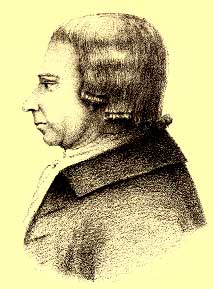| Profile | Major Works | Resources |
Dr. James Anderson, 1739-1808.

Dr. James Anderson was a Scottish agriculturalist, farmer, scientist, lawyer and dilettante (James Anderson LL.D.; not to be confused with contemporary namesake James Anderson, M.D., a physician in Madras). According to Schumpeter (1954), Dr. James Anderson "had to an unusual degree what so many economists lack, vision."
Raised on a farm in Midlothian, Anderson was primarily interested in the application of scientific principles to farming. Although he attended lectures at Edinburgh university, Anderson was not quite a part of the network of scholars of the Scottish Enlightenment, although he certainly imbibed in the scientific spirit of the age. A farmer by profession, Anderson was primarily self-taught in all manner of subjects. A practical as well as curious man, Anderson was the inventor of numerous agricultural improvements, most famously the "Scotch plough" for use on heavy soils. Most of his discoveries were disseminated in articles contributed to contemporary journals, notably the Edinburgh Weekly Magazine (published under a variety of pen-names, "Agricola", "Senex" and so on). In 1775, he published (anonymously) a volume of Essays on agricultural subjects which was quickly re-issued in 1776, with an extra volume, this time under his real name for the first time.. In one of his earliest and most famous performances, in an article on monsoons for the first edition of the Encyclopaedia Britannica, the young Anderson predicted, with remarkable accuracy, the discoveries made by Captain Cook in the south seas before he had returned to announce them.
After setting himself up on a large farm in Aberdeenshire, Anderson published his two most famous tracts in 1777, the Observations and the Inquiry, in which he introduced the differential theory of rent based on the extensive margin. Noting that lands of different degrees of fertility yield different surpluses, Anderson writes:
"Many persons will, therefore, be desirous of obtaining possession of these fertile fields, and will be content to give a certain premium for the privilege to cultivate them; which will be greater or smaller according to the more or less fertility of the soil. It is this premium which constitutes what we now call rent, a medium by means of which the expense of cultivating soils of very different degrees of fertility may be reduced to perfect equality." (Anderson, Observations, 1777: p.376)
In his Inquiry, Anderson provides a numerical example and even a formula for rent. He would reiterate this again in his later works, e.g.
"Rent is in fact nothing else than a simple and ingenious contrivance for equalizing the profits to be drawn from fields of different degrees of fertility." (Anderson, 1799: Vol. V, p.403).
Anderson's 1777 tracts were published a mere one year after Adam Smith's Wealth of Nations -- and it is likely that Smith grew aware of them (he certainly was aware of Anderson himself) . Robert Malthus came across his work in 1803.
It was only in 1815 that the differential theory of rent was taken up by Malthus, Ricardo, West and Torrens and placed at the center of the economic doctrines of the Classical School. However, Anderson differed from this later formulation in one important respect: he denied there were diminishing returns to cultivation in the intensive margin (i.e. diminishing returns to more intensive cultivation of a given plot of land). Predictably, Anderson was an enthusiastic believer that technical "improvements" could always overcome these, as his own contributions to agricultural technology had shown. In his 1799 Recreations and his 1801 Calm Investigation, he was vehement about the possibility of division of labor and increasing returns to scale in agriculture, e.g.
"The melioration of the soil must ever be proportioned to the means that are made use to augment its productiveness; and this will ever depend upon the quantity of labour and manure that is judiciously bestowed upon it. I mean to say that no permanent or general melioration to any considerable extent can ever be effected but by labour; and that, under skillful management, the degree of melioration will be proportioned to the labour that is bestowed upon the soil....In other words, the productiveness of the soil will be proportioned to the number of persons who are employed in active labour upon the soil, and the economy with which they conduct their operations." (Anderson, 1799: Vol. IV, p.375-6)
Anderson supported protectionist Corn Laws, believing that they encouraged British farmers to achieve the extent of cultivation necessary for these improvements to take effect.
In recognition of his contributions, Anderson received his doctorate in law from Aberdeen in 1780 and, in 1783, he left his farm in Aberdeenshire and moved to Edinburgh. In 1783, he circulated a private pamphlet on Scottish fisheries among his friends, which inadvertently brought him to the attention of the government. As a result, 1784, Anderson was commissioned (or rather conscripted) by the government to undertake a survey of fisheries in western Scotland (published 1785). His treaties on the American colonies (1776, 1782), were largely against Britain keeping the colonies - not out of any affectation for the colonists, but rather because he believed the colonies were economically detrimental to Britain (e.g. again invoking increasing returns, contra Franklin, Anderson argued that emigration from Britain to America hurt the progress of the British economy.)
From late 1790 to early 1794, Anderson edited The Bee, a literary and scientific journal, with a run of eighteen volumes. This landed him in a bit of an imbroglio, when government officials requested that Anderson give up the names of the anonymous author of some of the more controversial political articles in the journal (he refused). In 1797, Anderson moved to London, where he dedicated himself to quieter intellectual pursuits, which found expression in the series of volumes of his Recreations, where many of his ideas on rent and increasing returns were expressed. He died in West Ham.
|
Major Works of Dr. James Anderson
|
|
Resources on James Anderson
|
All rights reserved, Gonšalo L. Fonseca
